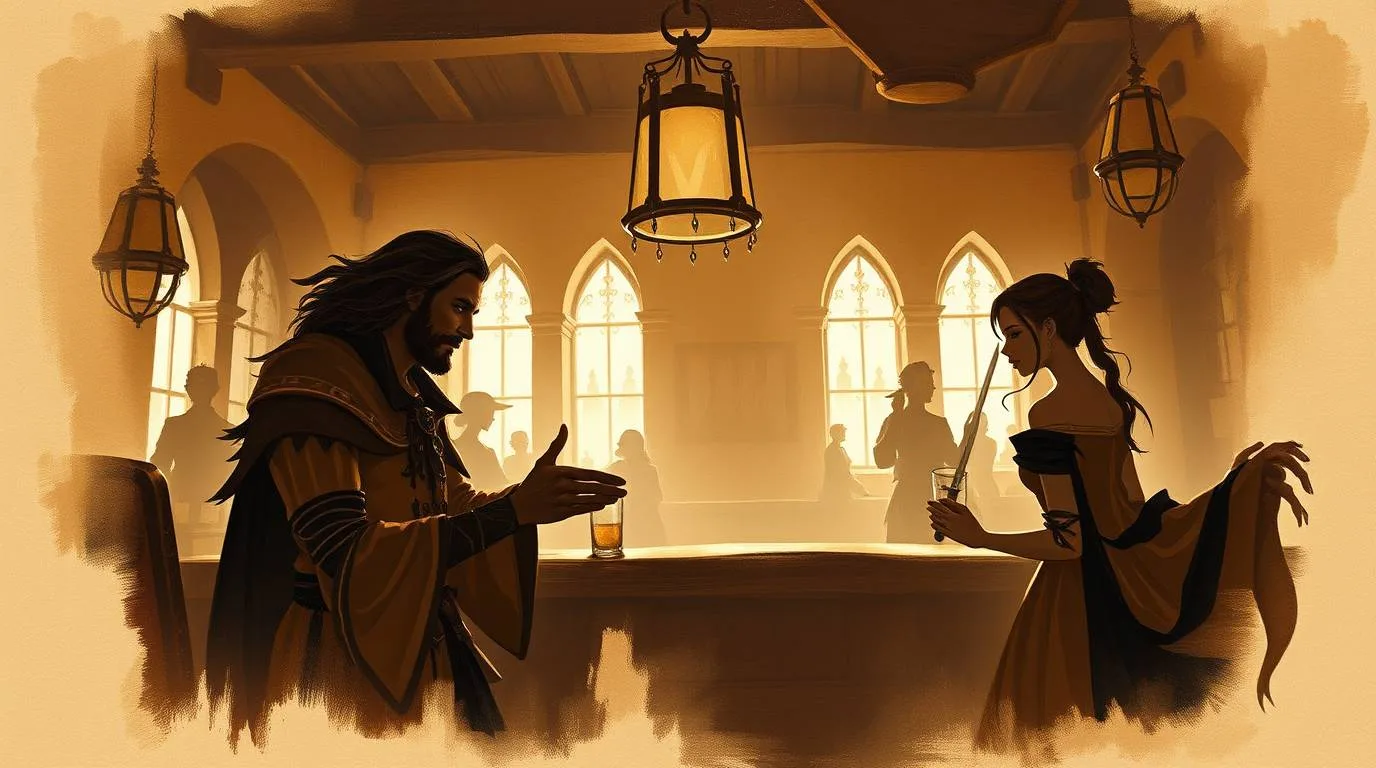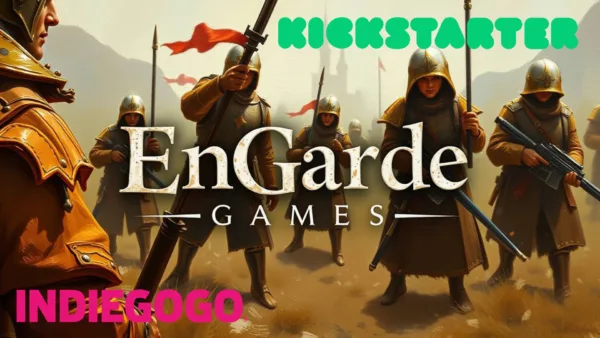EnGarde: Death Before Dishonor — The Pen & Paper Rebellion of 2025
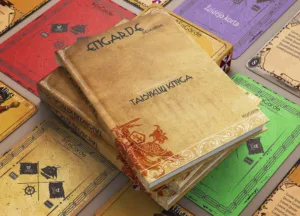 In the year 2025, as the EnGarde universe roared across tabletops and card tournaments, a quieter revolution took root—one whispered between candlelit tavern tables, scrawled in blood-stained journals, and thundered in dice rolls and oaths of steel. It was called EnGarde: Death Before Dishonor, a pen and paper roleplaying game that offered a brutal, deeply personal gateway into the war-torn world of EnGarde.
In the year 2025, as the EnGarde universe roared across tabletops and card tournaments, a quieter revolution took root—one whispered between candlelit tavern tables, scrawled in blood-stained journals, and thundered in dice rolls and oaths of steel. It was called EnGarde: Death Before Dishonor, a pen and paper roleplaying game that offered a brutal, deeply personal gateway into the war-torn world of EnGarde.
Unlike the strategic clashes of the EnGarde CCG or the mass army maneuvers of Battle for the Tron, Death Before Dishonor focused on individuals. Heroes, assassins, outcasts, warlords, and broken souls—each bearing the scars of a world where honor was a liability and survival was a choice made blade-first. It was a roleplaying game where every choice was dangerous, and every story could be immortal.
And, in a groundbreaking twist for the RPG world, your story could be submitted to the EnGarde Online System—and if chosen, would be brought to life through animated dramatizations, live-streamed reenactments, or even integrated directly into future supplements. One game night could echo across the globe.
A World Bound by Steel and Sorrow
The setting of EnGarde: Death Before Dishonor was a familiar one to veterans of the franchise: the shattered nations of Ruthgar, Selvara, Thonmar, and Kyvren, still gripped by centuries-long conflict. But this wasn’t a war of empires—it was a war of people. Here, the players weren’t commanders or card-wielders. They were mercenaries in a haunted wood. Duelists hunting political traitors in snowbound cities. Sorcerers who’d paid with their memories for one last spell.
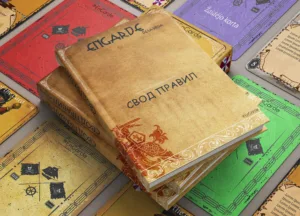 The RPG centered around the themes of loyalty, betrayal, glory, and sacrifice. Every character created was more than stats—they were layered with honor codes, personal vendettas, fractured pasts, and grim motivations. Whether playing as a Thonmar war-scout who’d betrayed his kin, or a Selvaran spy torn between two queens, the drama was always intimate. The world was cold, and steel was warmer than most people.
The RPG centered around the themes of loyalty, betrayal, glory, and sacrifice. Every character created was more than stats—they were layered with honor codes, personal vendettas, fractured pasts, and grim motivations. Whether playing as a Thonmar war-scout who’d betrayed his kin, or a Selvaran spy torn between two queens, the drama was always intimate. The world was cold, and steel was warmer than most people.
The EnGarde de la Rosa System
The game was built on the de la Rosa Engine, a narrative-first, tactical-second system named after the legendary swordmaster Rosa Vel-Nar, whose philosophy was that “a single blade changes a thousand lives.”
The system emphasized intense roleplay and cinematic action, blending gritty realism with dark fantasy. Combat was brutal – quick, personal, and unforgiving. Every duel had stakes. Every lie could cost a limb. And the world pushed back: random events, faction politics, and ancient monsters added constant pressure.
Players rolled with attribute dice pools, but success wasn’t just about numbers. Reputation, Personal Honor, and Infamy acted as currencies, allowing characters to influence the story world, gain allies – or become marked for death.
And yes, death was final. But die well? And your character could be memorialized in the Book of the Fallen, a global archive of player deaths voted by the community. Some even became NPCs in future campaigns – undead, vengeful, or legendary.
Live the Legend, Submit the Saga
What set Death Before Dishonor apart from other RPGs was its integrated story-tracking and broadcast submission system.
Through the official EnGarde Online Portal, GMs could register their campaigns, track narrative choices, and upload story logs. Each campaign received a unique ID, and its players’ characters were stored in a growing Living World Database.
But it didn’t stop there.
Each month, the EnGarde team selected standout stories – either for their depth, tragedy, or sheer brutal brilliance – and brought them to life. A player-led siege in Ruthgar might become a motion comic. A tragic betrayal between two Kyvren beast-kin might be reenacted by voice actors in an audio drama. Your game table could suddenly be canon.
Players even voted on world consequences. If a story about assassinating a Selvaran prince gained traction, future supplements might reflect that power vacuum.
This was a game where the line between player fiction and official lore no longer existed. The world was shaped by those willing to bleed for it.
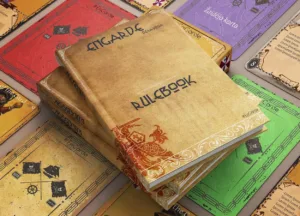 Track Your Character, See the Battle
Track Your Character, See the Battle
Even beyond storytelling, the integration went deeper.
Each character created and registered was part of the global EnGarde Identity Web. When used in EnGarde CCG or Battle for the Tron, those same characters – if surviving – could appear in other media. You could track your character’s “deck” location if they existed as a champion card. You could monitor how often your rogue was used in other campaigns around the world.
Imagine watching a livestream of a tournament in Tokyo where a player flips a card with your RPG character’s name and likeness – and then seeing how they’re used in battle.
Your pen and paper persona didn’t stay trapped in a journal.
They walked the world.
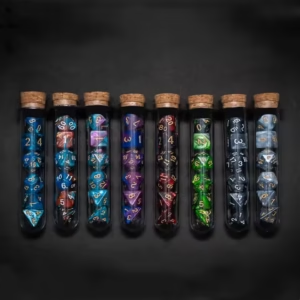 A Rose in the Frost
A Rose in the Frost
The first official campaign book, EnGarde: De la Rosa, was released with the core rules. It followed a shattered company of war orphans and ex-soldiers seeking vengeance on the very nations that abandoned them. Part war-epic, part political horror, De la Rosa offered dozens of branching narratives and introduced new factions like the Oathbound Dead – honor spirits who rise when warriors break sacred vows.
It set the tone: no easy answers. No safe endings. Just frost, fire, and the flash of steel.
Death Is Only the Beginning
As winter 2025 sets in, EnGarde: Death Before Dishonor is quickly becoming a cultural storm among TTRPG fans. Weekly episodes of Tales of the Dying Rose highlight player-submitted stories. New expansions are teased – one rumored to take place entirely inside the Tron itself. And a legendary player’s death story – where a lone Ruthgaran blade-dancer held off a corrupted army for seven turns – has become an international meme.
So now, the only question is:
Will you take the Oath?
Will you craft your hero, raise your blade, and carve your legend into the coldest battlefield the world has ever known?
Because in EnGarde: Death Before Dishonor, your blood writes the future.
And in this world…
It’s better to die than be forgotten.

